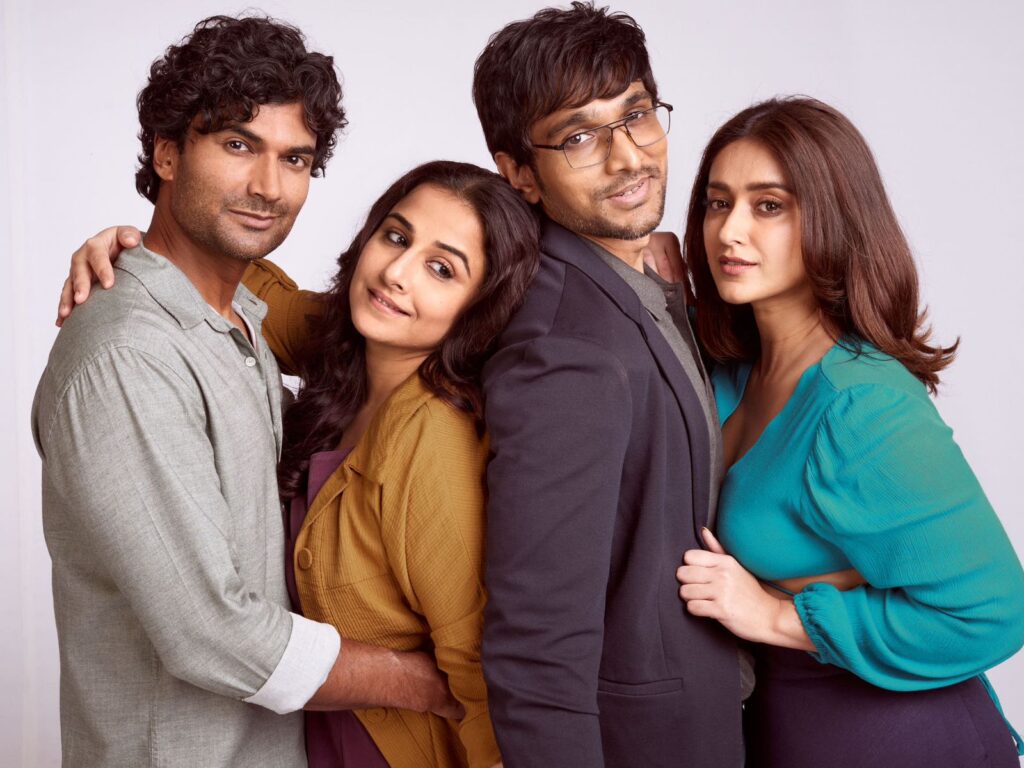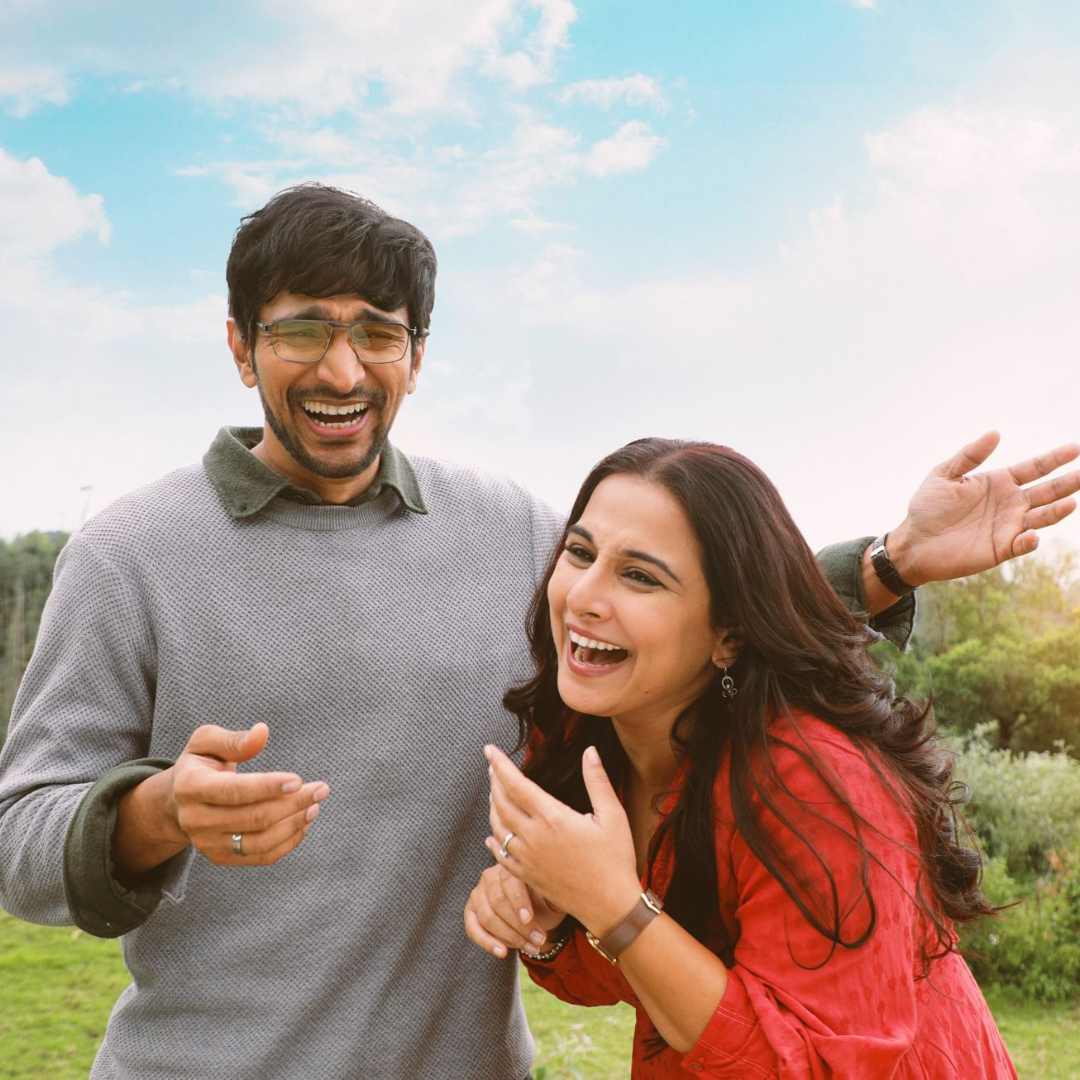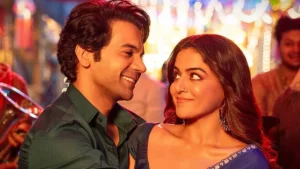
“I feel homesick when I’m not with you. This is it. This is what I want,” says Vikram (Sendhil Ramamurthy) to his still-married girlfriend Kavya (Vidya Balan). It is a familiar line, for sure, but it gets complicated the moment you realize the woman has a home to go back to and is in the process of making another. Director Shirsha Guha Thakurta’s Do Aur Do Pyaar is filled with dialogues and subtexts – some heart-rending and a few taken from self-help books.
Set in Mumbai, the film opens with Kavya and Vikram on a date and a later in their soon-to-be-possessed sea-facing apartment. An NRI photographer who has been traveling all his adult life, Vikram is alarmed thinking what would happen if he settles down for good. Kavya reassures him with her funda for life. The philosophy extends to comparing relationships to the act of using toothpaste. It’s all a bit verbose but it works. Soon we meet Kavya’s husband Ani (Pratik Gandhi), a workaholic gent, rehearsing dialogues with his actress-girlfriend Nora (Ileana D’Cruz). Right at the outset, you know they are supremely dissimilar people, much like Kavya and her beau.
The first thing that passed my mind was – how did these folks meet? If it were on a dating app, what are the odds of Kavya not finding her husband on them? Why wouldn’t Kavya and Ani sleep in different rooms? Why and when did they move out of love to invent an equation of cordiality? Do Aur Do Pyaar, somehow, has answers for events concerning the lead couple. Vikram and Nora spend a good part of the film expressing disappointment when their partners refuse to receive their ostensibly intrusive phone calls.
At one point in the film Kavya and Ani are watching a television show with a programme on penguins being monogamous while human beings are not. Guha Thakurta’s film is no Belle de Jour. It does not wish to enter the zone of desire. In what must be a take on couples growing out of love in marriages, monogamy is still a firm construct in the film even though it does not stigmatize separation or divorce. That aside, it is also noticeable how Do Aur Do Pyaar refuses to challenge the institution of marriage. It positively endorses the system with discourse smeared with idealism, “There is no secret. You just keep showing up every day,”
So, didn’t Kavya and Ani show up enough?
18 years ago, when Karan Johar conceived his designer adultery drama Kabhi Alvida Naa Kehna, the word on the street was unanimous. How could Maya (Rani Mukerji) leave a perfect husband (Abhishek Bachchan) and fall for a toxic, bitter man (Shah Rukh Khan)? Johar’s film ranked passionate love (‘Mohabbat’) as the backbone of successful matrimony whereas Do Aur Do Pyaar disagrees with the theory and asserts love isn’t enough. What is the mantra of holding a marriage together? Although minor commentaries, both films mention sex and parenthood as diversions. What else? If it was about communication (or the lack thereof), Guha Thakurta’s protagonists never talk to each other, let alone fight, or have sex.

Do Aur Do Pyaar is made exciting with the tiny details in the screenplay (Amrita Bagchi, Eisha Chopra, and Suprotim Sengupta). Be it Ani’s love for his Thakuma’s eggplant delicacy, Kavya’s veganism, and an unexplained fondness for stainless steel – the film is smart in the world it creates. When the equation improves, the couple begins to address each other by surnames (Ganesan and Banerjee). Through tiny passages, the film underlines the rust in their marriage that only needs to be sandpapered.
Later in the film, a detour to Ooty accelerates our interest in the couple’s story. At one point Kavya asks Ani if he noticed the laugh lines on her face. The woman is worried if she is aging whereas the man is least bothered about it. That said, a couple of its metaphors are equally overdone – such as the couple occupying aisle seats to maintain distance.
Addressing the familial side of their marriage, Kavya’s duel with her father (Thalaivasal Vijay) is well-executed despite the familiar strains in the writing. If anything jars, then it is the film’s language problem. With the characters communicating naturally in English and Tamil, the Hindi language feels like a liability in Do Aur Do Pyaar.
The Hindi language does come alive in the film’s singular, out-and-out brilliant stretch – the pre-climax where the couple discover each other’s flaws and secrets. It’s embarrassing and uncomfortable, yet the filmmaker tackles shame and grief with oodles of grace. Be it the intense close-ups (DOP: Kartik Vijay) or the edgy original score (Subhajit Mukherjee), it all works in humanizing Kavya and Ani. The climax, unfortunately, is a massive downer as it comes across as a compromise. The obstacles vanish without leaving a trace and Do Aur Do Pyaar designs a fairy tale finale that nobody asked for.
ALSO READ: ‘Sherni’ review – About bureaucracy, patriarchy, and a tigress on the prowl
The performances are unanimously solid with Vidya Balan reminding us why India adores her. It’s a balanced part and act, very much up her alley, to which she lends warmth and maturity. The actor’s genuine vibe prevents Kavya from becoming an archetypal bad wife. Balan’s part is also the film’s finest in terms of characterization. Kavya is a woman who seeks physical expressions of love – a common factor in every relationship of hers. “All my life I’ve been so greedy for love that if I don’t get it, I go take it wherever I can,” she confesses to her father, and we understand why the otherwise gentle person is an unrelenting, indecisive mess.
Pratik Gandhi becomes the perfect foil to his screen wife as the ‘Bengali Mappilai’ whom his Tamilian in-laws detest. The actor lends gravitas to the bespectacled man who sells corks to a Japanese delegation while slowly shedding his penchant for music, cooking and even smiling as responsibilities take over.
Ileana D’Cruz is splendid as the impulsive Nora who also goes by her screen name Rosie. Nora, quite evidently, is the writers’ ode to Arth and Guide – yesteryear Bollywood classics tackling extramarital themes. Sendhil Ramamurthy is the only one among the main leads to suffer from a half-baked part. Kavya and Vikram’s love is something the film never successfully sells, let alone give the man a consistent shade or two.
Do Aur Do Pyaar is an ambitious film, yet it wishes to send the right message to society – which is a tricky space to be in. I would want to know why the film strays far from awkward encounters. Reminiscent of the traffic signal scene in Kabhi Alvida Naa Kehna, Guha Thakurta’s male protagonists enter an elevator. The tension rises but the film does not milk the dramatic possibilities of Kavya spotting them together. Another similarity between the two films is when Nora buys a bouquet that eventually reaches Kavya through Ani. It’s just that Johar’s film, albeit all the melodrama, could turn a tiny prop into a plot-moving device. Do Aur Do Pyaar is too much of a textbook adultery tale to deviate a little or simply have some fun.
Rating: ★★★

